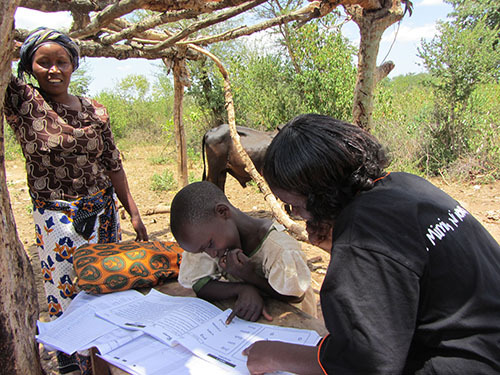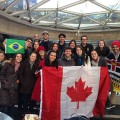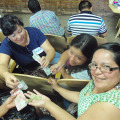
This past month in The Global Search for Education, I talked to global education leaders working at the frontiers of their fields to gather new perspectives on some of our greatest concerns in education today. Talking to educators from Latin America, Canada, Africa and China gave me a richer perspective on a number of the debates that we are having in order to find solutions in the United States. A common thread connects these thought leaders, which is a commitment to using innovative, hands-on methods to solve the problems of inadequate education programs.
From Latin America, I talked to several mathematics professors about imaginitive new techniques for teaching math in their classrooms. Dr. Claudia Maria Lara Galo (Universidad Panamericana, Guatemala) told me of “the importance of using simple objects as teaching material; as most schools are in very poor surroundings, they should creatively recycle objects that may be considered trash to design useful tools for learning.” This original solution allows for hands-on exploration while also cleverly dealing with impoverished living conditions that might seem insurmountable. It’s this kind of resourcefulness, along with teaching of math as it relates to Latin American history and to everyday life, that have helped Brazil show marvelous growth in its mathematics programs in recent years. The professors I spoke to all agreed that in celebrating math as part of Latin American heritage and culture, it will also benefit Latino students who have recently immigrated to America. As for what not to do, Professor Eliana Rojas (Neag School of Education, University of Connecticut) cautions that it is important to make sure that students from lower economic backgrounds don’t end up in schools where math is taught in “drill to kill” fashion without offering conversation and context.
From Canada, I talked to several experts about the growing need for study abroad programs. According to research conducted by Karen McBride (President and CEO of the Canadian Bureau for International Education), college students weren’t interested in studying abroad for financial reasons or because they had not had experience studying abroad in high school. However, as study abroad programs and international experience are so crucial to personal development, I was glad to see that strides were being made to explain the merits of study abroad. As Andy Jkrawczyk (former secondary school principal, international baccalaureate leader and education advisor to Global Study Pass) said, “Programs such as Global Study Pass offer an important step towards independent travel at an age that is hugely influential for young people. In addition, the cross-cultural learning focus and the leadership development that are provided help students to develop skills and perspectives at an influential time.”
From Africa, the leaders I spoke with shared profound perspectives on the interrelation of poverty, faulty education systems, and the cultural woes of this developing continent. As Dr. Sara Ruto (Regional Manager of Uwezo, a literacy and numeracy initative in Kenya, Tanzania and Uganda) put it: “Arguably the most dysfunctional education systems, especially public schools, are to be found in Africa. This is related to a bigger problem that is twofold: a washed away value system and lack of imagination.” I learned that there is much change being fostered in curricula as economic growth occurs in certain regions, but that not enough attention is being paid to the professional development of teachers, the teaching profession, and the imagination of the community.
Last but not least, from China, I talked with two education leaders who were visiting New York for a conference honoring Kuo Pin Wen. Wen studied with the education pioneer John Dewey at Teachers College, Columbia University, and went on to become the founder of the modern Chinese university. His desire to provide China with top-level higher education continues to be a significant influence to the present day. As for what Chinese education needs to do to achieve this goal in the near future, Yaqun Zhang (Professor, Institute of Education and Vice Director, Examination Research Center, Xiamen University) suggested: “increasing core courses in natural sciences, social sciences and humanistic studies, enhancing general education, expanding the choice of courses, developing professional proficiency of teachers, and improving the assessment for courses and management systems.” Perhaps, such changes would make the unequal rate of exchange between China and America (more students travel to study here than go there) ultimately even out.

(African photo is courtesy of Dr. Sara Ruto)
For more Around the World in 30 Days Articles: Around the World in 30 Days – March 2015, Around the World in 30 Days – February 2015, Around the World – January 2015, Around the World in 30 Days – December 2014, Around the World in 30 Days – November 2014
C. M. Rubin is the author of two widely read online series for which she received a 2011 Upton Sinclair award, “The Global Search for Education” and “How Will We Read?” She is also the author of three bestselling books, including The Real Alice in Wonderland, is the publisher of CMRubinWorld, and is a Disruptor Foundation Fellow.
Follow C. M. Rubin on Twitter: www.twitter.com/@cmrubinworld





Recent Comments